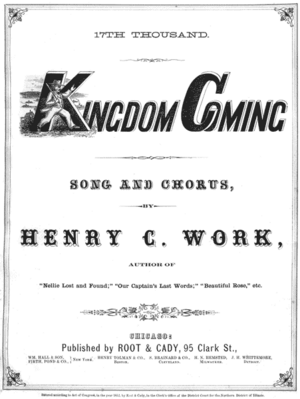Kingdom Coming facts for kids
Quick facts for kids "Kingdom Coming" |
|
|---|---|

The cover of the 1862 sheet music for "Kingdom Coming"
|
|
| Song by Henry Clay Work | |
| Written | before 1862 |
| Released | 1862 |
| Genre | Americana |
| Songwriter(s) | Henry C. Work |
"Kingdom Coming", also known as "The Year of Jubilo", is a famous American Civil War song. It was written and composed by Henry C. Work in 1862. This was before U.S. President Abraham Lincoln issued the Emancipation Proclamation, which declared many enslaved people free.
The song supports the Union side during the war. Its lyrics are sung from the viewpoint of enslaved people in areas controlled by the Confederacy. They celebrate their upcoming freedom as their master runs away from the approaching Union soldiers.
Work also wrote another song called "Babylon is Fallen." This song shows the Civil War from the perspective of Black U.S. soldiers fighting for the Union.
Contents
The Story in the Song
The song tells a story from the perspective of enslaved people. Their master runs away because Union forces are getting close. The enslaved people believe he might try to pretend he is a runaway himself to avoid being caught.
With their master gone, the enslaved people take action. They lock their overseer in a cellar. This is a way of getting back at him for treating them harshly. They then celebrate their coming freedom. They drink their absent owner's cider and wine in his kitchen.
Why the Lyrics Are Different Now
The original words of "Kingdom Coming" were written using an exaggerated way of speaking. This was how Henry Work thought Black people in the South talked. Because of this, the original lyrics are rarely sung today.
Instead, the song's tune is often played as a lively instrumental piece. You can hear it in the Ken Burns documentary The Civil War. The tune is also used in many Western or old-fashioned settings. These uses often have nothing to do with the Civil War itself.
Where You Might Hear It
"Kingdom Coming" has appeared in many cartoons, movies, and radio shows.
Cartoons
- The 1928 Mickey Mouse cartoon The Gallopin' Gaucho uses music from the song at the start and end.
- It became the opening music for the character Pooch the Pup. This started with the 1932 cartoon The Under Dog.
- The song appears in several MGM cartoons. These include The Three Little Pups and Billy Boy. A wolf character often whistles the tune in these cartoons.
- It also shows up in Warner Bros. cartoons. Examples are the 1938 Porky Pig cartoon Injun Trouble and the 1945 Bugs Bunny cartoon The Unruly Hare.
Films
- In Too Busy To Work (1932), the character Jubilo (Will Rogers) sings the song.
- In The Telegraph Trail (1933), John Trent (John Wayne) whistles this tune. It is also background music in The Horse Soldiers (1959).
- In Meet Me in St. Louis (1944), Esther Smith (Judy Garland) sings new lyrics to the tune. These new lyrics were written for the movie. They are in regular English and do not mention slavery or the Civil War.
Other Uses
- The tune of "Kingdom Coming" was the opening theme for the NBC radio show The Chase and Sanborn Hour from 1940 to 1949.
- In the late 1940s, the tune was used in a radio contest called "Stop The Music." People were called and asked to name the song for a prize.
- The tune was also used in the second part of John Philip Sousa's "Cubaland Suite."
Notable Recordings
Many artists have recorded "Kingdom Coming" over the years.
- The McGee Brothers and Todd recorded it in 1927 as "Old Master's Runaway."
- Frank Crumit recorded "Kingdom Coming and the Year of Jubilo" in 1927.
- "Tennessee" Ernie Ford had a hit song in 1958 called "Sunday Barbecue." This song used the same tune.
- The Holy Modal Rounders recorded the song in 1978 as "Year of Jubilo."
- The Red Clay Ramblers recorded it in 1975 on their album "Stolen Love."
- Jazz pianist Bill Carrothers included a piano version on his album The Blues and the Greys. This album features popular music from the Civil War time.
- The song appears on the soundtrack for Ken Burns' Civil War.
- Pokey LaFarge performed the song in the 2013 collection Divided and United: The Songs of the Civil War.
 | Percy Lavon Julian |
 | Katherine Johnson |
 | George Washington Carver |
 | Annie Easley |

